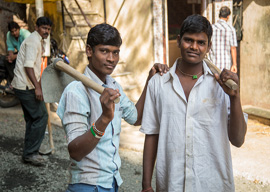
October 07, 2017

Source: Bigstock
It is a strange life, and none stranger than in the Gulf—the Persian Gulf, I mean, not that of Mexico, or even that of Carpentaria—where I have spent the past week.
For obvious climatic reasons, it is an air-conditioned life: You go from the air-conditioned aircraft to the air-conditioned airport to the air-conditioned car to the air-conditioned house to the air-conditioned mall to the air-conditioned restaurant and back. You try at all costs to avoid the natural ambient atmosphere—hot, humid, and unpleasant—which is like a sauna or Turkish hammam without its cleansing properties.
You drive up to an Indian-owned shop and toot your horn. An employee comes out and takes your order. When he returns, he has brought the wrong thing, so you send him back again (and again) until he gets it right. The whole process is very inefficient from the point of view of the time expended, but at least you have avoided the horrible heat; and anyway, time hangs as heavy in the Gulf (for those with a little money) as the natural ambient atmosphere. One begins to understand the sublime concision of the title of Miranda Miller’s book, A Thousand and One Coffee Mornings: Scenes From Saudi Arabia.
Every morning while I was there, I would wake at about eight and open my bedroom curtains (not the window, I need hardly add). I have rarely slept so well recently. Opposite was a house under construction, hand-built as it were by Indian labor. For a few moments I watched the laborers work in the sun and the heat until I returned to my self-appointed task, that of writing 500 words of my next book. Naturally I did it in comfort. If I wanted another coffee—delicious Turkish coffee with cardamom—I had only to call for it.
But the sight of the Indian laborers caused me unease. There are hundreds of thousands of them in the Gulf. I had seen some of them arrive at the airport, on the whole small men, mainly Dravidians from the south of the subcontinent. There are very few women among them; the housemaids in the Gulf are Filipina.
The pay of the Indian laborers is exiguous and their conditions are said to be awful. Never for a single day of my life, hardly for an hour, have I had to do work as uncomfortable as theirs. They are said to live in barracks, ten to a room, and their pay (so I was informed) is about $150 a month. Although it is illegal, their passports are frequently held by their employers, so that they are in effect trapped. I have seen for myself that they work long hours, with only short breaks. They have a ticket home every year or two, and a month off.
Are they happy? They don’t look it. There are suicides among them, but there are suicides among all groups of people. At night, when the temperature has dropped by two or three degrees, they gather near the souk, or elsewhere, but they do not look as if they are having much fun. The preponderance of males is overwhelming. Our comfort has been built at the expense of their discomfort.
But my sympathy for them (with just an edge of anger on their behalf) is fundamentally self-indulgent, for I know that I will forgo nothing and do nothing for them.
Instead, I control my feelings and tell myself what is true—that they have, after all, elected to come to the Gulf, and therefore doing so must represent an improvement or opportunity for them. Even if sometimes (or often) their passport is held as a kind of ransom, it is the life that they have chosen. Small as their remuneration may seem, they send some of it home to support a family, to build a house, to start a tiny business, and so forth. The sheer determination that this implies is heroic, and heroic on a mass scale. When I compare it with our—my—carping attitude to life, I feel ashamed.